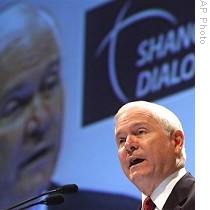Singapore
30 May 2009
 |
| US Secretary of Defense Robert Gates delivers keynote speech at Asia Security Summit in Singapore, 30 May 2009 |
U.S. Defense Secretary Robert Gates criticized North Korea Saturday for recklessly pursuing nuclear and missile capabilities while many of its people starved.
North Korea on Monday exploded a nuclear device and tested a series of missiles in defiance of the international community.
Gates told Asian defense officials they were all familiar with North Korea's tactic of creating a crisis and then demanding payment to end the crisis.
He said the United States and its allies were still open to dialogue with North Korea, but would not bend to provocation.
He said if North Korea would not conform to international norms, "painful" sanctions would be needed to end the nuclear program.
"We will not stand idly by as North Korea builds the capability to wreak destruction on any target in the region or on us. At the end of the day, the choice to continue as a destitute, international pariah or chart a new course is North Korea's alone to make. The world is waiting," he said.
Gates was speaking in Singapore at the Shangri-La Dialogue, an annual meeting of Asian defense ministers and experts on the region.
This year's meeting has been dominated by concerns about how to deal with a nuclear North Korea.
Talking about the U.S. role in Asia, Gates told the conference Washington's commitment to its allies was as strong as ever, but that greater multilateral cooperation was needed to deal with both old and new challenges to security.
Gates met Saturday afternoon with his counterparts from Japan and South Korea. The three sides pledged a common response to North Korea's actions.
Aside from so-called "rogue" nations like North Korea, he said Asia was also under threat from extremists.
"Extremists in Asia have engaged in terrorist acts such as in Bali, terrorist activity and guerrilla warfare in Mindanao, and they have plotted attacks in several Southeast Asian nations," he said. "They are inspired by and at times receive support directly from groups operating along the Afghan-Pakistani border ... Failure in a place like Afghanistan would have international reverberations. And, undoubtedly many of them would be felt in this part of the world."
Gates said he would like to see more Asian support for funding Afghanistan's security and building the country's institutions. He said there was a great need in Afghanistan for civilian experts, which he would like to see more Asian countries provide.
Gates applauded intelligence sharing on violent extremists in Asia, which he said had led to fewer terrorist attacks. He also commended cooperation in Asian seas against piracy and arms and drugs smuggling.